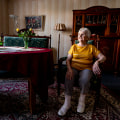Food can also be a key part of providing care. Home health care services may include home nursing care to help a person recover from surgery, accident, or illness. If the person has just left the hospital and is still in need of nursing care at home for a short period of time, the hospital can help arrange for the hiring of a home health assistant. Home health services can also help control long-term (chronic) diseases, such as diabetes, for example, by testing a person's blood sugar level or administering insulin through a pump.Caring for the elderly and providing Elderly Care in Gunpowder MD and Home Care in Bonita LA. Caring for the elderly and providing Elderly Care in Gunpowder MD and Home Care in Bonita LA affects the lives of millions of people in the United States. Older people may be at risk of serious physical and mental health problems. They may have difficulty living independently and may need to be moved to a nursing home or retirement community.
Health professionals may struggle to find the most effective treatment methods. And families may struggle to afford health care costs. As more people enter the elderly, the challenges of caring for the elderly will only become more complex. Fortunately, there are several tips, tools and resources that can help older people and those who are dedicated to ensuring that they receive the best medical care.
Providing effective care for older people can be difficult. However, resources are available that can help them and their loved ones, as well as their nurses, doctors and other health professionals. Older people who want to live in their own homes as they age can benefit from suggestions from the National Institute on Aging (NIA). These include planning for future needs.
For example, older people who have difficulty putting on their clothes every morning can ask their friends for help. Or if they notice that they are having difficulty shopping at the grocery store or paying certain bills on time, they can use automated payment or delivery services. Even older people who plan ahead for their care may need additional help from trained and licensed elderly care professionals. These professionals are known as geriatric care managers and work with older people and their families to develop long-term care plans, as well as to recommend and provide services that older people may need on a daily basis. According to the NIA, geriatric care managers perform tasks such as evaluating home care needs and conducting home visits.
Older people and their loved ones can locate a geriatric care manager using the U.S. National Office of Health. The NIA states that because older people have unique health needs, it's crucial that they and their families research potential geriatric care managers for emergency licensing, experience and training. Additional resources are available for friends and family members of older people to ensure they receive the best care.
Families may witness an older person's health begin to deteriorate and be unaware of the services available and how to provide the best care. Friends and family members can make plans to prepare for these financial challenges. Taylor recommends doing a financial inventory, in which families write down stocks, pensions, retirement funds or other investments that could be used to pay for care for the elderly. In addition, she writes about how family members can care for their loved ones by making hospital appointments or helping them with homework and researching possible insurance or health plan options. Even the most experienced health professionals can face difficulties in caring for the elderly.
Older people may experience hearing loss or cognitive dysfunction, leading to interruptions in communication and lack of trust. The NIA provides guidelines for nurses and health professionals on treating older patients. These tips include the use of the right way of addressing (referring to patients) by Mr. Professionals may have to treat elderly patients who have a cognitive illness such as Alzheimer's or dementia. The NIA recommends that professionals practice effective communication with their patients and potential caregivers.
This includes analyzing diagnosis and treatment plans, addressing patient safety, and organizing a support team made up of friends and family members to provide and monitor care. AARP has a detailed list of digital tools that can help older people and their caregivers. These tools range from devices that help older people monitor their medications to safety alert systems, such as a household sensor that detects abnormal movements in the household. MedMinder is a tool that AARP recommends to patients taking medications to efficiently plan their distribution and use.
Another component is an alert system for health professionals to keep medications under lock and key until it's time to take them. Tools such as LifeAlert, MobileHelp and 5Star Urgent Response can help older people in an emergency and ensure that they receive immediate medical help. For example, if an older person slips and falls in the garage and can't get in to get medical attention, these devices can call for help right away. Beyond emergencies, these portable devices can monitor vital signs and indicate if the user's blood pressure has risen or fallen or if sleep patterns have changed, which may indicate more serious conditions. Wearable devices can also track older people using GPS technology, so caregivers know where they are.
Among the most popular wearable devices are the Apple Watch, the Lively WearableLi and the Fitbit. Older people are often victims of telemarketing scams or other schemes. EverSafe is a service that monitors spending habits and tracks unusual trends in fraudulent purchases or giving money to people or companies with a bad reputation. Home motion sensors can also be an effective way to monitor loved ones.
These devices can track an elderly person's movements around the house and help loved ones monitor unusual or annoying activities. The most popular systems include the SimpliSafe and Vivint home security systems. Smart Home. Ensuring that older people receive appropriate medical care and are safe and secure is of the utmost importance to friends, family and professionals.
Here are some additional tips that can help when caring for older people. While there are warning signs that an older person's health may be worsening or that the person may be suffering from a certain condition, they may still be reluctant to talk openly and share information about their well-being. In an article for USA Today, Julia Graham, from Kaiser Health News, states that older people and their friends and family members should speak openly, but also communicate sensitively when it comes to health problems. Friends and family members should build relationships with professionals.
Health center professionals, including those who provide home care, can offer a deeper view of an older person's condition and establish a support team to ensure that the elderly person receives the best possible care. In addition, if friends and family members are prudent about the care their older loved ones receive, they can encourage the professional to strengthen the relationship between the patient and the provider. Friends and family members can help improve an older person's health by participating with them in regular activities and exercises. This could include setting a specific time of day or week to participate in a hobby that the older person enjoys or going out for regular walks.
The National Council on Aging also suggests different resources and programs that can help older people stay in shape. What you can learn about working with older adults in Bradley's FNP program. Bradley University Online Nursing Programs. It can be overwhelming to understand your options for long-term services and supports, especially if you must make these decisions very quickly.
Healthcare providers must be patient when treating older people. Sometimes, providers have to repeat conversation topics several times before the patient fully understands the message. If communication requires too much repetition, healthcare providers should slow down the speed of speech and speak more clearly until the client can understand. Older patients may also take longer to react during conversations. Healthcare providers can ensure patient comfort with simple gestures, such as offering a blanket or sweater to cold customers.
Family nursing professionals have the ability to provide care for older patients as part of a family care office. They can find work in hospitals, doctor's offices, outpatient care centers or in their own offices, among other medical centers. WHNPs also work with adult women who are going through menopause and provide care for elderly patients and older women with a variety of chronic conditions. To provide personalized insurance advice and assistance to Medicare beneficiaries, their families, friends and caregivers.
Maintaining the comfort of older patients can be difficult, especially for those with several diseases. Some provide transportation: the center can pick up the person, take them to daycare, and then return them home. By treating each older person as an individual, care providers can break age-related stereotypes and achieve positive outcomes. They may even be able to work in a classroom and teach future AGNPs how to have a positive impact on the healthcare industry. Maintaining the comfort of older patients can be difficult, especially for those with several diseases. Some provide transportation: the center can pick up the person, take them to daycare, and then return them home. By treating each older person as an individual, care providers can break age-related stereotypes and achieve positive outcomes. They may even be able to work in a classroom and teach future AGNPs how to have a positive impact on the healthcare industry.
To find a home health care service, ask your doctor or other health professional about good options in your area.










